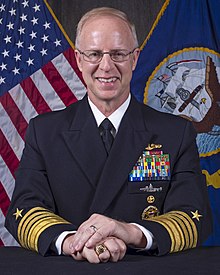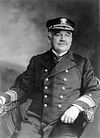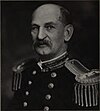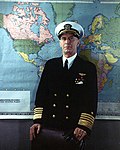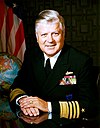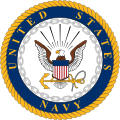Commander, U.S. Fleet Forces Command
| Commander, U.S. Fleet Forces Command | |
|---|---|
 Seal of the Commander, U.S. Fleet Forces Command | |
 Flag of a U.S. Navy four-star admiral | |
since December 7, 2021 | |
| United States Fleet Forces Command | |
| Abbreviation | COMUSFF COMFLTFORCOM |
| Reports to |
|
| Seat | Naval Support Activity Hampton Roads, Virginia, U.S. |
| Appointer | The President with Senate advice and consent |
| Term length | 2–3 years (approx.) |
| Formation |
|
| First holder | RADM Robley D. Evans |
| Deputy | Deputy Commander, U.S. Fleet Forces Command |
| Website | www |
The Commander, U.S. Fleet Forces Command (COMUSFF/COMFLTFORCOM) is the title of the United States Navy officer who serves as the commanding officer of the United States Fleet Forces Command. The U.S. Fleet Forces Command was originally established in 1905 as the U.S. Atlantic Fleet and as a two-star rear admiral's billet;[1] the position has been held by a four-star admiral since March 10, 1915.[1] The 45th, and current, commander of U.S. Fleet Forces Command is Admiral Daryl L. Caudle.
Title's history
[edit]
The first Commander-in-Chief of the Atlantic Fleet was Rear Admiral Robley D. Evans, who assumed command on January 1, 1906 aboard his flagship the battleship USS Maine (BB-10).[1]
The title, Commander-in-Chief, U.S. Atlantic Fleet, was continuously used from 1906 until 1923 and again from 1941 to 2002.[1] In a reorganization of the United States Fleet in 1923, that title was abolished and the title Commander Scouting Force was used.[1] On February 1, 1941, General Order 143 reestablished the title and reorganized the United States Fleet into three separate fleets: the U.S. Atlantic Fleet, the U.S. Pacific Fleet and the U.S. Asiatic Fleet.[1] The order further stated each fleet would be under the command of a four-star admiral.[1] Thus, on February 1, 1941, Rear Admiral Ernest J. King, in his flagship USS Texas (BB-35) at Culebra, Puerto Rico, hauled down his two-star flag and hoisted his four-star flag as Commander-in-Chief, U.S. Atlantic Fleet.[1]
After the end of World War II, the organization of the United States armed forces was reviewed with a view toward reorganization after the turbulent war years.[1] On December 1, 1947, under a reorganization act of the armed forces approved by Congress, the unified combatant command, United States Atlantic Command, was established with headquarters co-located to those of the U.S. Atlantic Fleet.[1] Admiral William H.P. Blandy was given the dual-hatted command of both U.S. Atlantic Fleet and U.S. Atlantic Command thus becoming the Commander-in-Chief, U.S. Atlantic Fleet and the first Commander-in-Chief, U.S. Atlantic Command.[1] The two titles remained linked until another reorganization of the armed forces, via the Goldwater-Nichols Act in 1985, separated the U.S. Atlantic Command from the U.S. Atlantic Fleet.[1]

In the early 1950s, the North Atlantic Treaty Organization (NATO) decided to establish a new major command, Allied Command Atlantic, under the command of a U.S. four-star admiral with headquarters in Norfolk, VA.[1] Since this was primarily a naval command responsible for allied defense of the North Atlantic, the decision was made to co-locate this organization with that of the U.S. Atlantic Command and U.S. Atlantic Fleet, to form a triple-hatted command.[1] On April 10, 1952, Admiral Lynde D. McCormick, the Commander-in-Chief, U.S. Atlantic Command and U.S. Atlantic Fleet, assumed the additional title as the first Supreme Allied Commander Atlantic.[1] Like the U.S. Atlantic Command, the Allied Command Atlantic remained intact and part of a triple-hatted command organization until the Goldwater-Nichols Act occurred in 1985.[1] The Goldwater-Nichols Act separated command of the U.S. Atlantic Fleet from the other two commands giving the U.S. Atlantic Fleet its own four-star admiral.[1] Admiral Wesley L. McDonald was the last U.S. Navy admiral to command all three organizations at the same time.[1] He relinquished command of the U.S. Atlantic Fleet to Admiral Carlisle A. H. Trost on October 4, 1985.[1]
However, under the Goldwater-Nichols Act, the admiral filling the post of Commander-in-Chief, U.S. Atlantic Fleet, would also serve as the Deputy Commander-in-Chief, U.S. Atlantic Command.[1] This role for CINCLANTFLT continued until 1986 when the Secretary of Defense approved a separate billet for the Deputy Commander-in-Chief, U.S. Atlantic Command.[1] On September 16, 1986, Admiral Frank B. Kelso II relinquished the Deputy USCINCLANT post to Major General Thomas G. Darling, USAF.[1]

On October 1, 2001, the Chief of Naval Operations designated the CINCLANTFLT to concurrently serve as Commander, U.S. Fleet Forces Command.[1] U.S. Fleet Forces Command became responsible for overall coordination, establishment, and implementation of integrated requirements and policies for manning, equipping, and training Atlantic and Pacific Fleet units during the inter-deployment training cycle.[1]
On October 24, 2002, Secretary of Defense Donald Rumsfeld directed that the title of "Commander-in-Chief" be reserved solely for the President of the United States.[1] In a message to Naval Commanders-in-Chief, the Chief of Naval Operations directed a change of title to that of "Commander."[1] This change affected the U.S. Atlantic Fleet, U.S. Pacific Fleet, and U.S. Naval Forces Europe thus renaming Commander-in-Chief, U.S. Atlantic Fleet to Commander, U.S. Atlantic Fleet.[1]
On May 23, 2006, the Chief of Naval Operations ordered the assimilation of U.S. Atlantic Fleet into U.S. Fleet Forces Command and that the dual-hatted position be integrated to its current title of Commander, U.S. Fleet Forces Command.[1]
On October 31, 2006, a ceremony was held to officially mark the transition of the U.S. Atlantic Fleet and U.S. Fleet Forces Command to just U.S. Fleet Forces Command.[1] Three of the 37 previous admirals who held the top post in the Atlantic fleet attended the ceremony, which was held aboard the aircraft carrier USS Theodore Roosevelt (CVN-71).[1]
Appointment
[edit]The Commander, U.S. Fleet Forces Command is nominated by the President for appointment from any eligible officers holding the rank of rear admiral (lower half) or above,[2] who also meets the requirements for the position, under the advice and/or recommendation of the Secretary of the Navy, the Chief of Naval Operations, and if applicable the Chairman of the Joint Chiefs of Staff.[2] The nominee must be confirmed via majority vote by the Senate.[2] For the Navy, flag officer tours are usually limited to two years.[3]
List of commanders
[edit]| No. | Commander[4] | Term | |||||
|---|---|---|---|---|---|---|---|
| Portrait | Name | Took office | Left office | Term length | |||
| Commander-in-Chief, Atlantic Fleet | |||||||
| 1 | Rear Admiral Robley D. Evans (1846–1912) | January 1, 1906 | May 9, 1908 | 2 years, 129 days | |||
| 2 | Rear Admiral Charles S. Sperry (1847–1911) | May 9, 1908 | March 1909 | ~296 days | |||
| 3 | Rear Admiral Seaton Schroeder (1849–1922) | March 1909 | June 1911 | ~2 years, 92 days | |||
| 4 | Rear Admiral Hugo W. Osterhaus (1851–1927) | June 1911 | January 1913 | ~1 year, 214 days | |||
| 5 | Rear Admiral Charles J. Badger (1853–1932) | January 1913 | September 1914 | ~1 year, 243 days | |||
| 6 | Admiral Frank F. Fletcher (1855–1928) [5] | September 1914 | June 1916 | ~1 year, 274 days | |||
| 7 | Admiral Henry T. Mayo (1856–1937) | June 1916 | June 1919 | ~3 years, 0 days | |||
| 8 | Admiral Henry B. Wilson Jr. (1861–1954) | June 1919 | June 1921 | ~2 years, 0 days | |||
| 9 | Admiral Hilary P. Jones Jr. (1863–1938) | June 1919 | December 1922 | ~1 year, 183 days | |||
| Position redesignated as Commander, Scouting Fleet from 1922 to 1931; Commander, Scouting Force from 1931 to 1941 | |||||||
| Commander-in-Chief, U.S. Atlantic Fleet | |||||||
| 10 | Admiral Ernest J. King (1878–1956) | February 1, 1941 | December 30, 1941 | 332 days | |||
| 11 | Admiral Royal E. Ingersoll (1883–1976) | December 30, 1941 | November 15, 1944 | 2 years, 321 days | |||
| 12 | Admiral Jonas H. Ingram (1886–1952) | November 15, 1944 | September 26, 1946 | 1 year, 315 days | |||
| 13 | Admiral Marc A. Mitscher (1887–1947) | September 26, 1946 | February 3, 1947 | 130 days | |||
| Commander-in-Chief, U.S. Atlantic Fleet / Commander-in-Chief, U.S. Atlantic Command | |||||||
| 14 | Admiral William H. P. Blandy (1890–1954) | February 3, 1947 | February 1, 1950 | 2 years, 363 days | |||
| 15 | Admiral William M. Fechteler (1896–1967) | February 1, 1950 | August 15, 1951 | 1 year, 195 days | |||
| Commander-in-Chief, U.S. Atlantic Fleet / Commander-in-Chief, U.S. Atlantic Command / Supreme Allied Commander Atlantic | |||||||
| 16 | Admiral Lynde D. McCormick (1895–1956) | August 15, 1951 | April 12, 1954 | 2 years, 240 days | |||
| 17 | Admiral Jerauld Wright (1898–1995) | April 12, 1954 | February 28, 1960 | 5 years, 322 days | |||
| 18 | Admiral Robert L. Dennison (1901–1980) | February 28, 1960 | April 30, 1963 | 3 years, 61 days | |||
| 19 | Admiral Harold P. Smith (1904–1993) | April 30, 1963 | April 30, 1965 | 2 years, 0 days | |||
| 20 | Admiral Thomas H. Moorer (1912–2004) | April 30, 1965 | June 17, 1967 | 2 years, 48 days | |||
| 21 | Admiral Ephraim P. Holmes (1908–1997) | June 17, 1967 | September 30, 1970 | 3 years, 105 days | |||
| 22 | Admiral Charles K. Duncan (1911–1994) | September 30, 1970 | October 31, 1972 | 2 years, 31 days | |||
| 23 | Admiral Ralph W. Cousins (1915–2009) | October 31, 1972 | May 30, 1975 | 2 years, 211 days | |||
| 24 | Admiral Isaac C. Kidd Jr. (1919–1999) | May 30, 1975 | September 30, 1978 | 3 years, 123 days | |||
| 25 | Admiral Harry D. Train II (born 1927) | September 30, 1978 | September 30, 1982 | 4 years, 0 days | |||
| 26 | Admiral Wesley L. McDonald (1924–2009) | September 30, 1982 | October 4, 1985 | 3 years, 4 days | |||
| Commander-in-Chief, U.S. Atlantic Fleet / Deputy Commander-in-Chief, U.S. Atlantic Command | |||||||
| 27 | Admiral Carlisle A. H. Trost (born 1930) | October 4, 1985 | June 30, 1986 | 269 days | |||
| 28 | Admiral Frank B. Kelso II (1933–2013) | June 30, 1986 | September 16, 1986 | 78 days | |||
| Commander-in-Chief, U.S. Atlantic Fleet | |||||||
| 28 | Admiral Frank B. Kelso II (1933–2013) | September 16, 1986 | November 4, 1988 | 2 years, 49 days | |||
| 29 | Admiral Powell F. Carter Jr. (1931–2017) | November 4, 1988 | January 31, 1991 | 2 years, 88 days | |||
| 30 | Admiral Paul David Miller (born 1941) | January 31, 1991 | July 13, 1992 | 1 year, 164 days | |||
| 31 | Admiral Henry H. Mauz Jr. (born 1936) | July 13, 1992 | October 5, 1994 | 2 years, 84 days | |||
| 32 | Admiral William J. Flanagan Jr. (born 1943) | October 5, 1994 | December 20, 1996 | 2 years, 76 days | |||
| 33 | Admiral J. Paul Reason (born 1941) | December 20, 1996 | September 17, 1999 | 2 years, 271 days | |||
| 34 | Admiral Vern Clark (born 1944) | September 17, 1999 | June 23, 2000 | 280 days | |||
| 35 | Admiral Robert J. Natter (born 1945) | June 23, 2000 | October 1, 2002 | 2 years, 100 days | |||
| Commander-in-Chief, U.S. Atlantic Fleet / Commander, U.S. Fleet Forces Command | |||||||
| 35 | Admiral Robert J. Natter (born 1945) | October 1, 2002 | October 24, 2002 | 23 days | |||
| Commander, U.S. Atlantic Fleet / Commander, U.S. Fleet Forces Command | |||||||
| 35 | Admiral Robert J. Natter (born 1945) | October 24, 2002 | October 3, 2003 | 344 days | |||
| 36 | Admiral William J. Fallon (born 1944) | October 3, 2003 | February 18, 2005 | 1 year, 138 days | |||
| 37 | Admiral John B. Nathman (born 1948) | February 18, 2005 | May 22, 2006 | 1 year, 93 days | |||
| Commander, U.S. Fleet Forces Command | |||||||
| 38 | Admiral John B. Nathman (born 1948) | May 22, 2006 | May 16, 2007 | 359 days | |||
| 39 | Admiral Gary Roughead (born 1951) | May 17, 2007 | September 29, 2007 | 134 days | |||
| 40 | Admiral Jonathan W. Greenert (born 1953) | September 29, 2007 | July 23, 2009 | 1 year, 297 days | |||
| 41 | Admiral John C. Harvey Jr. (born 1951) | July 24, 2009 | September 14, 2012 | 3 years, 52 days | |||
| 42 | Admiral William E. Gortney (born 1955) | September 14, 2012 | November 21, 2014[6] | 2 years, 68 days | |||
| - | Vice Admiral Nora W. Tyson (born 1957) Acting | November 21, 2014[6] | December 19, 2014 | 28 days | |||
| Commander, U.S. Fleet Forces Command / Commander, U.S. Naval Forces Northern Command | |||||||
| 43 | Admiral Philip S. Davidson (born 1960) | December 19, 2014 | May 4, 2018 | 3 years, 136 days | |||
| 44 | Admiral Christopher W. Grady (born 1962) | May 4, 2018 | February 1, 2019 | 273 days | |||
| Commander, U.S. Fleet Forces Command / Commander, U.S. Naval Forces Northern Command and U.S. Naval Forces Strategic Command / Joint Functional Maritime Component Commander | |||||||
| 44 | Admiral Christopher W. Grady (born 1962) | February 1, 2019 | December 7, 2021 | 2 years, 309 days | |||
| 45 | Admiral Daryl L. Caudle (born 1963) | December 7, 2021 | Incumbent | 3 years, 117 days | |||
See also
[edit]References
[edit]- ^ a b c d e f g h i j k l m n o p q r s t u v w x y z aa ab ac ad "A Brief History Of The U.S. Fleet Forces Command". United States Navy. Archived from the original on May 11, 2019. Retrieved October 2, 2009.
- ^ a b c [1] 10 USC 601. Positions of importance and responsibility: generals and lieutenant generals; admirals and vice admirals.
- ^ "Chief of Naval Operations. Navy Military Personnel Assignment Policy, 2006, pg 6" (PDF). Archived from the original (PDF) on February 24, 2013. Retrieved September 19, 2013.
- ^ "Previous Commanders - U.S. Fleet Forces Command". U.S. Fleet Forces Command. Retrieved December 19, 2021.
- ^ Fletcher originally assumed office as a rear admiral then was promoted to admiral in 1915 bypassing the rank of vice admiral.
- ^ a b LaGrone, Sam (November 20, 2014). "Fleet Forces Deputy CO to Temporarily Take Command, Change of Command Cancelled". USNI News. Retrieved December 16, 2021.
![]() This article incorporates public domain material from the United States Navy
This article incorporates public domain material from the United States Navy
External links
[edit]- U.S. Fleet Forces Command official website
- List of U.S. Fleet Forces Command commanders

